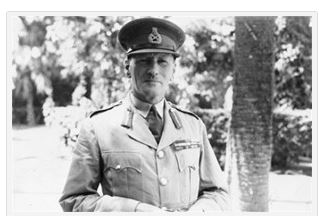
Sir Claude John Eyre Auchinleck, GCB, GCIE, CSI, DSO, OBE (21 June 1884 in Aldershot to March 23, 1981 in Marrakech), also known as the Auk, was a British field marshal during World War II.
Claude Auchinleck was born on 21 June 1884 in Aldershot, the eldest of four children of artillery colonel John Alexander Claude Auchinleck. Claude, whose father died when he was eight years old, grew up in impoverished circumstances. Still, he, through hard work and scholarship, was in a position to graduate from the Royal Military Academy Sandhurst. He was a career soldier in the army for a long time in India, working for the country and developing sympathies with the ordinary soldiers under his command.
In May 1940, during World War II, Auchinleck was the commander of the Allied forces in Norway, an operation that was doomed to fail. After the fall of Norway in July 1940, he on 19 July 1940 became General Officer Commander-in-Chief of the Southern Command and then commander in chief in India.
After various successes and failures of the Allied and Axis forces in North Africa, Auchinleck, in July 1941, was appointed to succeed General (and later Field Marshal) Sir Archibald Wavell as supreme commander of the Allied forces in the Middle East. Wavell replaced Auchinleck and assumed the position as the commander of the Indian Army.
Auchinleck had its headquarters in Cairo and was not only responsible for North Africa but also for Iran and the Middle East. The eighth British army confronted the German Afrika Corps, and Italian units fought firstly under the command of Sir Alan Cunningham and then of Sir Neil Ritchie.
The initial success of El Agheila (January 1942) was followed by a defeat at Bir al-Hakim (June 1942), in which the Axis powers of Colonel-General (and later Field Marshal) Erwin Rommel were commanded. Auchinleck withdrew its forces 400 kilometers back to Egypt. The city of Tobruk (for Winston Churchill, it had great political significance; for Auchinleck, however, it had no big military weightiness) fell on 21 June.
The advance of the Axis powers was settled finally at the First Battle of El Alamein by the British 8th Army, now under the direct command of Auchinleck and Ritchie. Auchinleck, however, had terrible luck with some of his most senior officers. Some were incompetent, some were killed, and others were taken prisoner.
Like his opponent, Rommel (and his predecessor, Wavell), Auchinleck was accused of constantly interfering in political affairs. He received several intimidating messages and instructions from British Prime Minister Winston Churchill at the end of 1941 and in the spring and summer of 1942. Churchill constantly called for an offensive from Auchinleck and was downcast at military defeats in Egypt and Cyrenaica. Churchill was desperate for some British victory before the planned Allied landings in North Africa, Operation Torch, in November 1942. Auchinleck asked on 31 July, when the forces of the 8th Army were exhausted, an end to offensive operations and the strengthening of the defense to prepare for a big counter-offensive.
Churchill flew in August 1942 for consultations with Auchinleck, as they said, to Cairo. Now, it is inevitable that Churchill had already taken his decision before leaving Britain. Auchinleck was in August 1942, removed from office because he refused to order a significant offensive before he and his troops were prepared correctly. He was replaced by General Harold Alexander as commander in chief of the Middle East and by Lieutenant-General William Gott as supreme commander of the 8th Army.
Gott was killed in Egypt before taking up command, after which General Bernard Montgomery, as commander of the 8th Army, was deployed. Montgomery launched the major offensive in question, the Second Battle of El Alamein, on 23 October 1942, later than it had proposed in his time as commander of Auchinleck.
Churchill offered to Auchinleck the command of the allied forces in Persia and the Middle East, but Auchinleck declined. Instead, he went back to India, where he remained idle for a year, almost until 1943, when he was appointed as the chief of the Indian army – Wavell was then Governor-General of India.
He was promoted to field marshal in 1946. However, he refused to accept a peerage. Unfortunately, his wife had left him in the same year. After a disagreement with Lord Mountbatten, the last Viceroy of India, he stepped down as commander-in-chief in 1947 and retired. In 1948, he returned to Britain.
During his retirement, Auchinleck moved to Marrakech, where he lived for years in a modest apartment. Until his death on 23 March 1981, Corporal Malcolm James Millward took care of him there.
